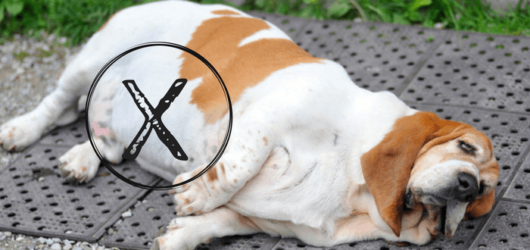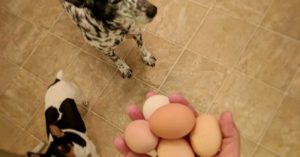Obesity, for humans and pets, is a serious health problem that needs to be dealt with as quickly as possible. Overweight dogs, in particular, have been increasing for many years. Recent research studies show that our best friends’ weight problem is rapidly reaching the crisis point, where dogs actually die because of it! The study reveals that nearly half of the pets seen by veterinarians are overweight.
The dog population in the United States reached 89.7 million in 2017, whereas in the UK it researched 8.5 million. Out of the total percentage of the population in the United States, 54% of those dogs are overweighed and nearly the same in the UK reaching 50%!
In fact, obesity can reduce the dog’s life by up to three years with a highly increased incidence of heart disease and diabetes along with blood pressure issues.
In the following article, we will be dealing with the causes of overweight dogs, the consequences of such illness, and how to avoid it by applying a suitable diet for your dog!
Table of Contents
1. Why are there overweight dogs?
Apparently, not all dog owners are aware that they have overweight dogs, they rather think of them as “cute”. Ironically, the first biggest reason for their dogs’ obesity is their own extra caring and the over-given Food.
Most people express their love by giving their dogs food that they enjoy eating. The problem is that the foods their dogs enjoy the most are likely the worst for their health.
Dogs, just like humans, find sugars and fats tempting to a great extent. Most of the popular dog foods, canned treats, and table-scraps found in any local stores are, without doubt, high in fat or sugar and sometimes both!
Eventually, over time, the excess fats and sugars are stored in fat cells, to be more precise, sugar is converted to fat for storage and as the years pass by, the pounds, that are supposed to be there, start to pile up.
According to veterinarians, the owner cannot tell by weighing a dog and then search for the idol weight because each breed has its own weight and shape characteristics. The only way possible that helps dog owners is to look at body shape and evaluate body fat. Does your pet have a potbelly that can be seen? When you look from above, does your dog have a waist, in other words, does the overall body shape taper after the rib cage? Can you feel your dog’s ribs? Because no waist and the none appearing ribs are signs that it is high time for you to consult your veterinarian.
There is an acceptable degree of overweight dogs that can be tolerated; therefore, the average “chubby” pet is usually at least 15 percent overweight, No more!
2. Consequences of Overweight on Dogs
Obesity is first and for most a nutritional disease. It is defined as the storage of fats in the body, or like what veterinarians always describe “obesity is an excess of body fat”.
Dogs that are overnourished, lack the ability to exercise or have a tendency to retain weight are the most at risk for becoming obese. Obesity can result in serious health issues, such as reducing the lifespan, even if your dog is just moderately obese, it can harm the dog indirectly. Certain areas of the body are affected by excess body fat, including the joints and sometimes the bones, the digestive organs in particular, and the organs responsible for breathing capacity.
Obesity is very common in dogs of all ages, but it usually appears in middle-aged dogs, more specifically, in dogs between the ages of 4 and 10. The common symptoms are as follows:
-
Longevity
-
Endocrine disease
-
Dyslipidemia
-
Orthopedic disorders
-
Cardiopulmonary disease and hypertension
3. How to get your dog to lose weight: Tips to Slim down Your dog
- The first step to getting your overweight dog to lose weight is by reducing the regularly consumed dog food by 25 % and adding vegetables instead. The vitamins and minerals existing in the natural food will definitely help strengthen your dog’s joints and bones.
- If you want to see quick results i.e. in 2-3 weeks timeframe, try to serve the food at regular times, for instance only 4 small meals a day.
- Avoid feeding your dog snacks and especially treats, these are fast food equivalents only for dogs. They are full of carbohydrates and fats that can only hurt your dog and turn it into a treat junkie!
- Always look for the healthiest dog foods brands, you can check our article on the Best 15 Dog Food Brands for 2017. It is important that you know the gradual weight loss is preferred because dog breeds differ in weight loss, for some breeds losing one pound in a week is too much, therefore, if you don’t see results in 45 days, consult your veterinarian, and keep in mind the type of food you’re using for your dog.
- Do not directly eliminate the fats and sugars from your dog’s daily consumption, because some fats are better than others. For example, fish oil, flaxseed oil, and foods that contain omega 3 and 6 fatty acids are very nutritious and essential for canines. Other fats found in cookies or chips are animal fats, they are not helpful when putting your dog on a diet.
- Include treats high in fivers to replace the one you used to give to your dog, which usually has lots of “ undesired” calories. These treats include rice cakes,
frozen green beans, Watermelon chunks, and carrot chips. Here is an example Healthy Dog Treats - Don’t you ever give fast food to your dog? Avoid also eating junk food in front of the dog so it won’t beg for a bite.
- In case you own more than one pet, try to train the pets to eat at separate times from each other, because you may encounter problems if the bowls are mixed.
- Trash cans must be out of the dog’s sight and don’t leave the food on the kitchen table counter.Note:
Garlic has made a huge debate among veterinarians. Some of them advise their patients to avoid including it in the diet because it has serious side effects when consumed regularly and with large portions. In contrast, others recommend serving garlic in very small portions because it is helpful to the digesting system; the suitable way is by crunching one to two cloves a day in the food given, it will help in the process of losing weight. - Try to include your dog in your weekly or daily exercises if you are an athlete. Walks and jogs are a great step, to begin with. Try to not exaggerate in the exercises, only a few hours per week are suitable to lose weight for dogs.
- Some breeds such as golden retrievers, beagles, and border collies are prone to weight gain, mostly because they don’t get involved in outdoor activities that much.
4. Some healthy Good Foods for Dogs:
- Apples (they contain potassium, which stimulates the immune system, and pepsin, which helps the stomach)
- Brewers yeast (health aid and can help remedy some skin conditions)
- Broccoli (rich in vitamins)
- Carrots (rich in vitamins, great treats to substitute for biscuits)
- Cabbage (rich in vitamins, good for digestive system and skin)
- Cucumber (good for teeth and bones due to potassium content; can combine with carrots to promote a healthy liver and kidneys; in juice form, a good diuretic … peel cucumbers unless organically grown)
- Celery (chopped or juiced; can help with arthritis)
- Flaxseed oil, fish oil, omega 3 and 6 supplements (beneficial and essential fatty acids)
- Green beans (lightly steamed; healthy and low-cal treat)
- Parsley (can reduce allergy symptoms and aid kidney function; chop finely or boil parsley and add the juice over food)
- Kale (rich in antioxidants and can help reduce allergy symptoms)
- Green or yellow squash, asparagus, and spinach (very healthy; serve chopped)
- Another veggie snack idea: cooked skins from organically grown potatoes.
- Bananas (in small quantity; a coveted treat)
- Whole grains including oats, oatmeal, brown rice, millet
- Cereal grasses, such as barley grass, and barley supplements
- Tofu
- Olive oil, sesame oil (a tablespoon a day is good for skin and fur)
- Vitamin B complex can bolster health, calm a stressed nervous system and help repel fleas. A suggested dose is 50 mg of B complex once a day for smaller dogs and cats, and twice daily for larger dogs.



